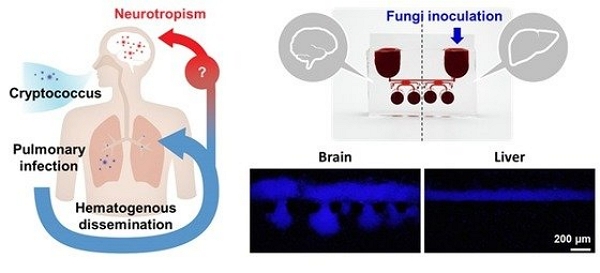The National Research Foundation of Korea said Tuesday that a Yonsei University research team has designed an organ-on-a-chip (OOC) modeled after the blood-brain barrier (BBB) that blocks pathogens and transmits only necessary substances.

The research team, led by Professors Bahn Yong-sun and Cho Seung-woo of the Department of Biotechnology at Yonsei University, implemented the flow of a hydrogel and culture solution that modeled the extracellular matrix of the brain tissue on a microfluidic chip. Researchers then cultured neural stem cells and cerebrovascular cells and developed an OOC that resembles the human brain containing cerebral blood vessels.
The study revealed the mechanism of brain infection by pathogenic fungus Cryptococcus neoformans using the new OOC. Cryptococcus neoformans (C. neoformans) is the most common pathogen causing fungal meningitis.
Although C. neoformans is known to freely cross the BBB, how the fungus penetrates the brain has not been clarified.
The research team observed fungus gathering around the brain's blood vessels and crossed the barrier when injected into the OOC and discovered genes involved in the process. However, C. neoformans mutants with related genes removed could not penetrate the BBB.
Recently, microfluidic organs on chips that can process various samples by controlling the flow of liquid in a microtube with a micrometer diameter have attracted attention as an in vitro model. The device can accurately control fluid flow to replicate human organs more precisely than the existing two-dimensional cell culture method.
According to the foundation, there were difficulties in developing organ chips due to the complex structure and cellular components of the BBB.
BBB is a selectively permeable membrane surrounding the brain and central nervous system (CNS), preventing solutions in the circulating blood from non-selectively crossing to protect the brain from pathogens and potentially harmful substances.
C. neoformans, which infects the human body through the respiratory tract, causes meningitis or encephalitis by penetrating BBB after spreading throughout the body via blood circulation.
The research team expects the study results to be applied to research, including developing candidates for fungal meningitis treatment and discovering compounds that can cross the BBB.
The study results were published in the international journal Nature Biomedical Engineering on Tuesday.

